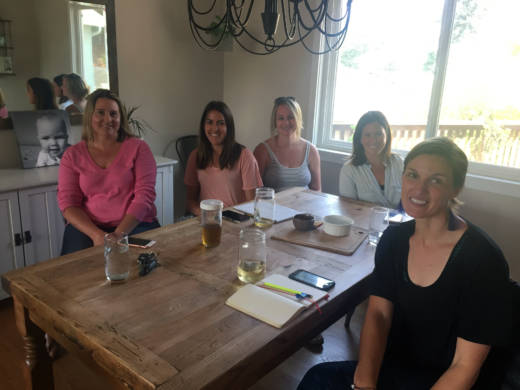"I remember him walking down my parents' driveway, and I was like, 'Oh, my boyfriend's going out of county, I’m so cool,' " Katy said. "And now 12 years later ... a baby, one on the way, and this is only our second fire season with a baby ... I’m like, 'Oh my God.' "
Twelve years later, with her husband away for weeks at a time, Katy is feeding her daughter, fixing things that break around the house and working part time.
That’s hard, but she has found a group of women who get it.
They support each other through the day-to-day and with larger emotional issues. One of the big ones is a consistent undercurrent of fear, Simone Wallace said. Fear that your husband could die from any number of hazards out in the field.
"So the worry exists but it doesn’t take over," Simone said. "Life goes on. There’s kids and picture day."
"You’ve got to keep your head in the game," said Mollie Lounibos, who used to be a firefighter herself. She's sitting across from Simone.
"You're supporting your partner," Mollie said. "And if you're calling and you're crying and you're complaining or you're worried, they can't focus on their jobs."
The key to not complaining, says Mikayla Mersereau, who's sitting next to Simone, is to stop pitying yourself — to stop playing the victim.
"I took this mind-shift change where I said, 'Wow, he's missing a lot,' " Mikalya said. "He's missing the kid's birthday. He's missing Christmas."
And when things get tough, they lean on each other.
"We took my daughter to the hospital the other night," Adrienne McTigue said. "I called this one 6 in the morning and I say, 'Can you take my other two kids because Bret had to go to work? And she's like, 'I'm on my way over.' "
Just like family would. And that’s how being married to a firefighter feels like to these women. When they see a fire department sticker on the back of someone else’s car, they know they’re a part of that family.
That sticking together goes for their kids, too: to be able to share the odd improvisations that become necessary when parents get called away for weeks at a time or have to be on duty at their home station for big occasions.
"It does help when they’re sad and they say, 'Oh, Ben’s thinking the same thing right now,' " Mollie said.
"Or hey, Santa’s coming a day early to the Mersereau house, too," Mikayla said.
Sometimes, Mikayla said, they actually have Christmas at the firehouse together.
This summer, three Marin firefighters were burned battling the Carr Fire near Redding. Simone’s husband was there. He wasn’t hurt, but just the mention of this brings the talkative group to a halt — and to tears. Simone shakes her head, she can’t speak, Mikayla pulls her in for a hug. Mollie jumps in.
"Having a burnover of any sort is ... it’s like the worst nightmare," Mollie said.
"Just the word burnover is ... ," Katy is lost for words. "When Mike said some of the guys got burned over, I just went into mom mode. Like who. Who needs what ... are we ... tell me."
Their support network mobilized, Katy said.
Going into action mode like that, in a way, comes easy. Sometimes what’s harder to deal with are the emotional issues when their husbands come home.
They bring back extreme fatigue and trauma from what they’ve seen in the field. It can make coming home to kids, and lots to do around the house, all the more overwhelming.
"We've dealt with it on multiple different levels of just learning to communicate about it," Katy said. "That de-stressor day when they first get home is just a wash. I expect nothing. I plan nothing."
Often during that transition day, these women say their husbands will lie on the couch all day just to recover. Then they're left running the household for one more day — adjusting one more time to make a marriage under stress work.
This post was corrected to fix the name Molly Lunabus. Her name is Mollie Lounibos.

